“We saw Paris with a sword in our hands!”
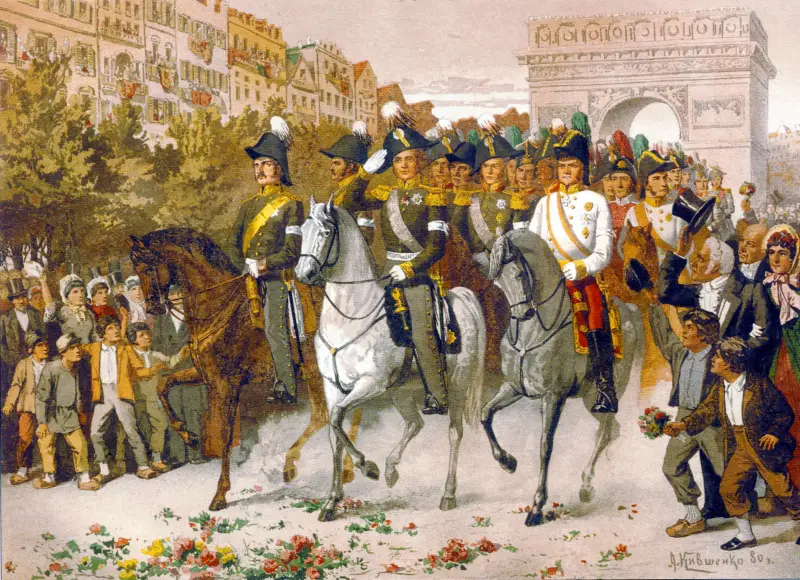
The entry of Emperor Alexander I and his allies to Paris. 1814. Chromolithography. By watercolor drawings by the artist A. D. Kivshenko
Battle of Saint-Dizier
While the armies of Schwarzenberg and Blucher were crushing the corps of Marmont and Mortier, they were advancing on Paris (To Paris! Battles of Arcy-sur-Aube and Fère-Champenoise), the 10-strong cavalry corps of Baron Ferdinand Wintzingerode, with the support of the Cossack detachments of Chernyshev, Seslavin, Kaisarov, and Tettenborn, demonstrated that almost the entire Main Army opposed Napoleon. He also had to conduct reconnaissance, monitor the movements of the enemy and send quartermaster teams for the imaginary preparation of quarters for the allied monarchs.
Campaigner Alexander Benkendorf recalled:
On March 26, 1814, Napoleon decided to conduct intensive reconnaissance at Saint-Dizier. The French drove Tettenborn's detachment beyond the Marne. Wintzingerode hastily assembled his corps.
The French cavalry forded the river, the infantry, having captured the bridge, passed through the city and attacked the allies. The French cavalry broke through the center of the position and drove our cavalry back to the swamps. The Russian regiments tried to restore order, but they failed to do so under the well-aimed fire of enemy artillery. A retreat began, which almost turned into a general flight.
Only thanks to the successful actions of General Benckendorff using the Izyum, Pavlograd and Elisavetgrad hussar regiments, which held the road to Bar-le-Duc, was it possible to restrain the enemy, bring the troops in order and avoid disaster. Night stopped the battle and allowed our troops to escape defeat. Wintzingerode's corps was defeated, but completed its task, distracting the enemy for two days while the Allies reached Paris.
At this time, Napoleon learned that the enemy was marching on Paris. The French Emperor praised this step:
I would never have believed that any Allied general was capable of doing this.”
On March 28, Napoleon Bonaparte hastened to save his capital.
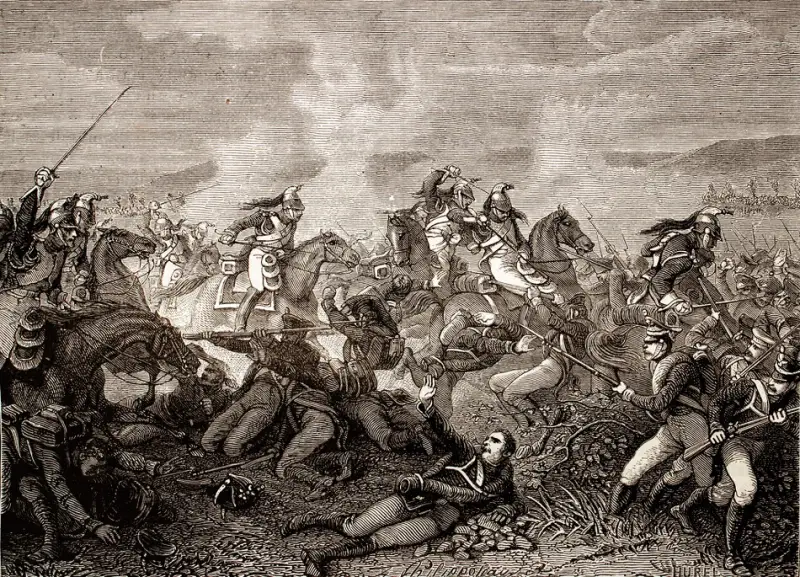
Battle of Saint-Dizier March 26, 1814 introduction of the Dragoon Guards. Felix Emmanuel Henri Philippoteau
"Paris, Paris!"
After the brilliant success at Fer-Champenause, the Russian cavalry continued the march to Paris, but at a slower pace (need for rest). The infantry corps followed. On the evening of March 29, 1814, the allied armies reached the French capital in three powerful columns. The right column was led by Blücher, the central column by Barclay de Tolly, the left column by the Crown Prince of Württemberg, it walked along the right bank of the Seine.
– Alexander Mikhailovsky-Danilevsky. "Description of the campaign in France in 1814."
In Paris, panic reigned not only among ordinary citizens, but also among the authorities. The capital was full of rumors about “wild Cossacks and Kalmyks” who want to burn the city to avenge Moscow. French propaganda worked, which portrayed Russians as “wild Asians”, “bloody monsters” who spare no one on their way.
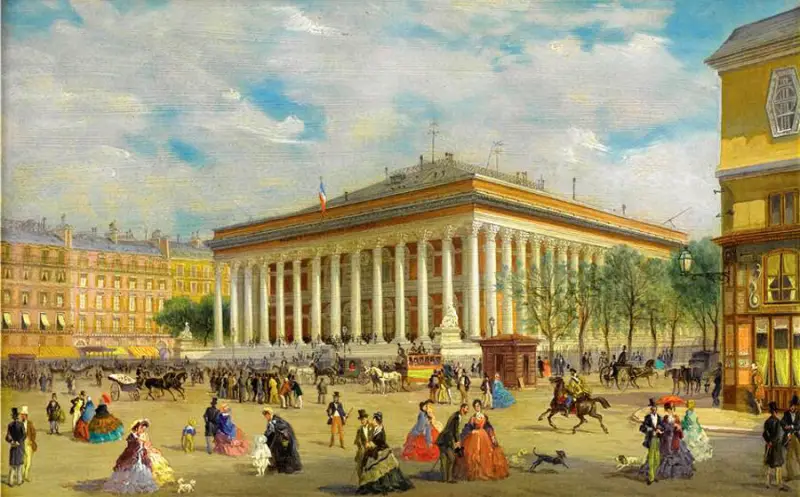
Palace Brongniart (Exchange). Giuseppe Canella
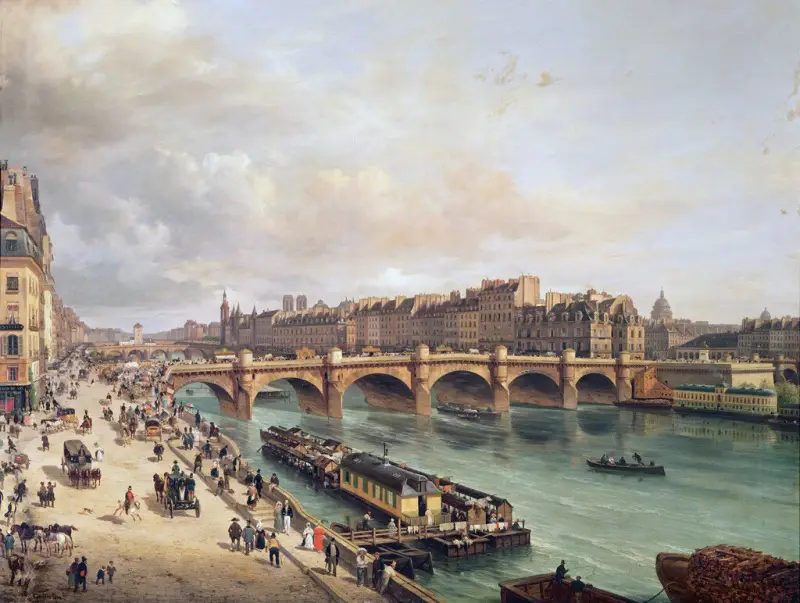
Pont Neuf, Paris. Giuseppe Canella
During the 1814 campaign, Paris could have been prepared for serious defense. The city lived a peaceful life, although people were, like weapon. However, during Napoleon's reign, everyone got used to the fact that the emperor always wins outside France and blindly believed in his genius.
Apparently, therefore, when the enemy armies were already two marches from Paris, they still did nothing to defend the capital. Advanced field fortifications were not built, streets were not blocked with barricades; National Guard units were formed and armed sluggishly; there were not enough horses for the artillery, weapons and ammunition were not delivered on time, etc.
In the capital, from the moment Napoleon left for the army, Empress Marie-Louise was formally in charge of everything; in fact, the leader of Paris was the emperor’s brother, King Joseph Bonaparte.
On March 28, the Regency Council was assembled to resolve the issue of evacuating the empress and heir to the throne, François Joseph Charles Bonaparte. At first, the council decided that the departure of the empress and heir was tantamount to the surrender of Paris. Therefore, they should walk the streets and visit the suburbs to inspire the citizens. But Joseph Bonaparte read Napoleon's letters, in which he demanded, in case of danger, to take his family out of the capital so that they would not fall into the hands of France's enemies.
On the morning of March 29, the Empress and baby Napoleon II (born in 1811) left the capital, heading to Blois.
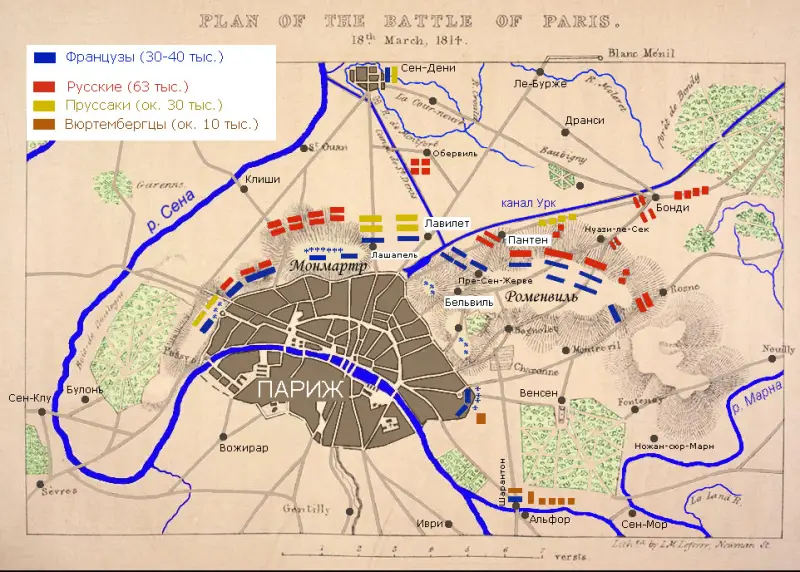
Plan of the battle for Paris in 1814. The date March 18 is indicated according to the old style
Despite the weakness of the command, the passivity of the authorities and the indifference of many townspeople, the French garrison was able to hold back the enemy for some time. There were good positions: the heights of Montmartre in the north and Romainville in the east of the city were a serious obstacle for the enemy. There were many stone buildings and walls in the outskirts.
The city was defended by the weak corps of Marmont and Mortier, a small number of reserve line troops, militia of the National Guard, city militia, veterans, veteran gunners, etc. In total, according to various estimates, from 32 to 44 thousand soldiers with 150 guns.
The Parisian governor Joseph Bonaparte exercised general leadership, giving complete freedom to the marshals. Marmont stationed his forces on the heights of Romainville, Mortier - on the Chaumont hills, near the villages of Lavillette and Lachapelle. The cavalry of Belltar and Ornano protected the left flank as far as the Seine. Joseph himself was on the Montmartre Hill with troops of the National Guard, and at the Clichy outpost was the Chief of Staff of the National Guard, Marshal Moncey.
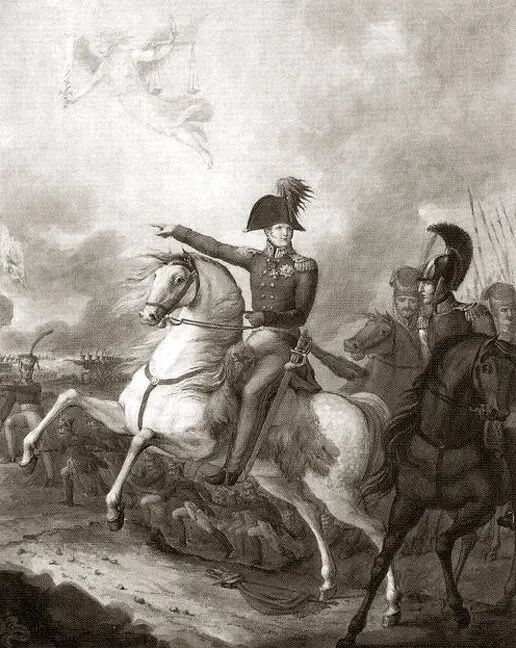
Alexander I under the walls of Paris, 1814. I. A. Ivanov
Storm of Paris
If the coalition armies had launched the assault simultaneously, as planned, in the early morning of March 30, 1814, the French troops would not have held out long. There were not enough French troops to cover the flanks.
But again poor interaction and lack of unified command had an effect. The left column of William of Württemberg and the Austrians were still deep in the rear and could launch an attack well after noon on March 30. Schwarzenberg's adjutant, who was on his way with orders to Blucher, got lost and was late. Therefore, most of the Silesian army was ready to attack six hours later.
The Allies understood that they could not delay the onslaught; Napoleon could appear at any moment. Therefore, Barclay de Tolly did not wait until all the troops arrived and were lined up for an assault from all directions.
At 6 a.m., Raevsky’s corps began an attack on Romenville, and Eugene of Württemberg’s corps launched an attack on Panten. Russian troops captured important enemy positions even before the general assault began, and the entire brunt of the battle fell on this point.
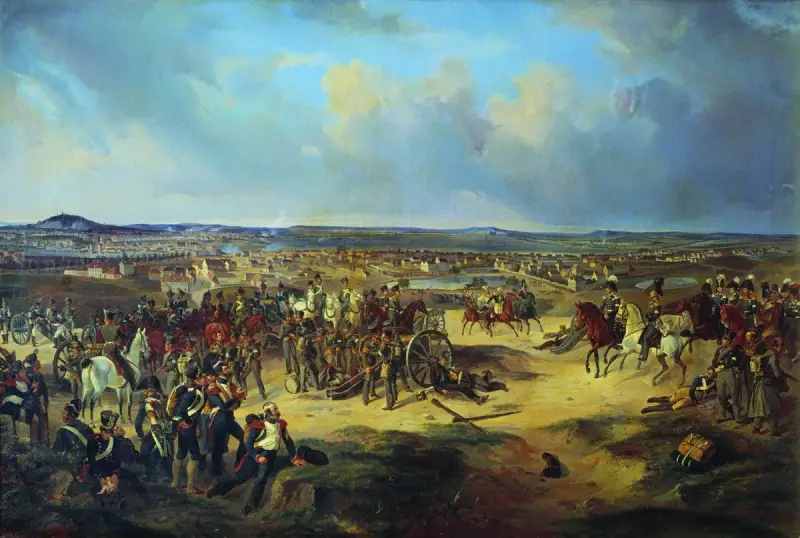
Battle of Paris in 1814 Hood. B. Villevalde (1834)
The French understood the importance of these positions and launched a counterattack. Marshal Marmont tried to drive the enemy out of Romainville and occupy the nearby forest. The fierce battle lasted for about two hours, both sides fought bravely and suffered heavy losses.
Barclay personally commanded the first line. He sent reinforcements to Raevsky and Duke Eugene - two divisions of the 3rd Grenadier Corps, and built the regiments into battalion columns. At the same time, Barclay ordered Raevsky not to launch a new attack until the Württemberg troops of Prince William took their positions on the left flank, and Mortier’s troops attacked on the right flank.
However, the approaching Russian Guard, which had not yet fought in the campaign of 1814, launched an assault in the Pantin area. The French stopped their attack: the order was broken among the stone houses and gardens. The battle turned into indiscriminate skirmishes, fires and their extinguishing.
But the French were unable to dislodge the Russians from their positions and pulled back to Belleville, where they were supported by strong artillery.
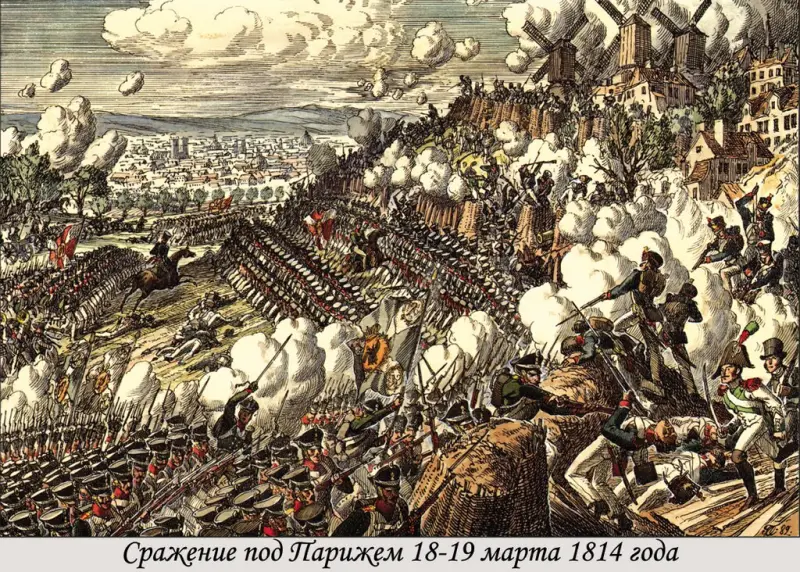
Artist Oleg Parkhaev
By 11 o'clock the Silesian army was ready for battle. General Langeron was the first to move the Russian regiments, having heard the artillery battle and without waiting for an order. He blockaded Saint Denis and was supposed to attack Montmartre. The corps of York and Kleist advanced on the villages of Lavillette and Lachapelle.
Meanwhile, King Joseph Bonaparte, who was in Montmartre and observed the gigantic battle, decided not to risk it. He headed to Blois after the empress, taking 4 thousand selected guardsmen as an escort. Joseph also gave written permission from Marshal Marmont and Mortier to begin negotiations.
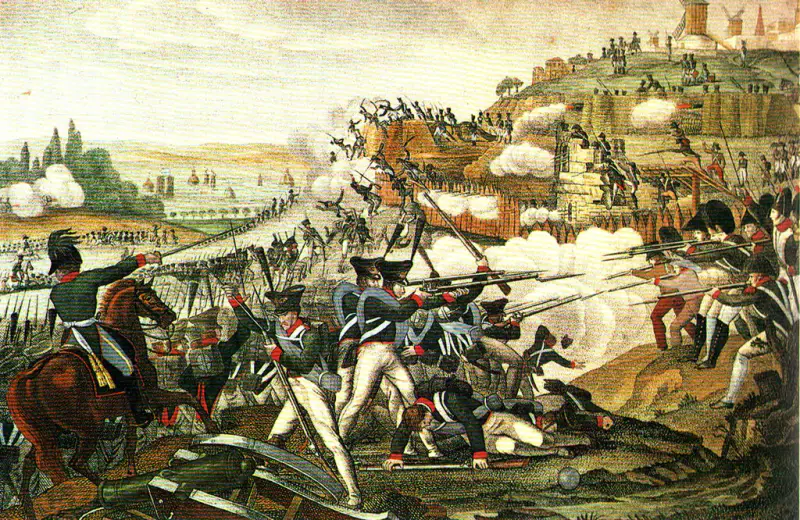
Siege of Paris. Colorized engraving by Lambert
At one o'clock in the afternoon the column of the Crown Prince of Württemberg crossed the Marne and attacked the extreme right flank of the French defense from the east. Having encountered weak resistance (there were few French troops here), the Württembergers marched through the Bois de Vincennes and captured the village of Charenton. A threat arose to the entire right flank of the French defense.
At the same time, the French, as before, fought bravely and steadfastly, despite the superiority of the Russians and allies in strength. Thus, Marshal de Moncey led the defense of the Clichy outpost. When all the French units were already retreating, the marshal fought stubbornly all day, having under his command only veterans, reinforced by graduates of the Polytechnic School and wounded soldiers.
By three o'clock in the afternoon, all Allied corps were lined up and ready to attack. The Austrians of Giulai appeared only at four o'clock, when the outcome of the battle was already clear.
Blücher sent part of his troops to help Barclay's Russians. On the left French flank, the corps of York and Kleist knocked out the enemy from Lavillette and LaChapelle. Langeron's corps advanced towards Montmartre.
In the center, Russian infantry and grenadier divisions knocked out the enemy from the main positions within an hour and a half. Belleville soon fell. Russian artillery quickly moved forward and began to control the city from the eastern heights.
Russian poet and campaigner Konstantin Batyushkov wrote:
But the gunfire became stronger and stronger hour by hour. We advanced with great loss through Bagnolet to Belleville, a suburb of Paris. All the heights are occupied by artillery; another minute, and Paris will be bombarded with cannonballs. Do you want this? “The French sent an officer to negotiate, and the guns fell silent.
Wounded Russian officers passed by us and congratulated us on our victory. "God bless! We saw Paris with a sword in our hands!”
“We avenged Moscow!” repeated the soldiers, bandaging their wounds.”
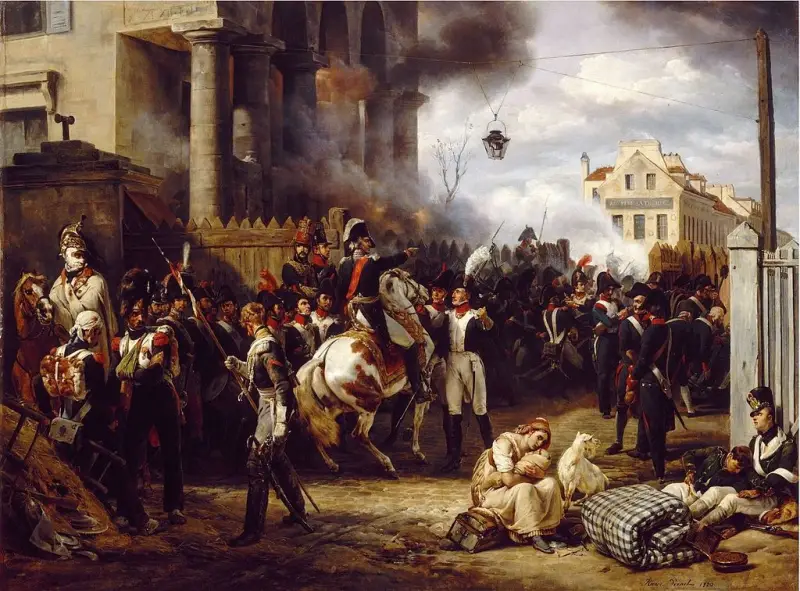
Defense of the Clichy outpost in Paris in 1814. Painting by O. Vernet, who was a participant in the defense of Paris
"The city of Paris is handed over to the generosity of the allied sovereigns"
Soon, the wounded Marshal Auguste Frederic Louis Viesse de Marmont, Duke of Ragusa, realizing that he was about to be outflanked, decided to begin negotiations with the allies. He would later be accused of cowardice and treason, although the commander of the defense, King Joseph, simply escaped. It was from then on that the word “Ragusa” became synonymous with the word “traitor” in France, and the verb “raguser” appeared in French, which translated means “mean to betray.”
By five o'clock in the afternoon, Marmont sent envoys to the Russian Emperor Alexander Pavlovich. Alexander I demanded surrender:
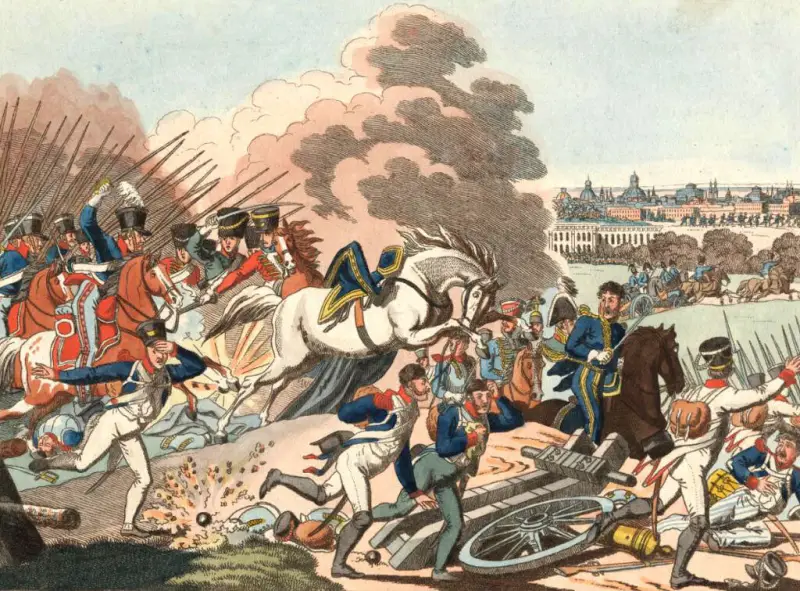
Battle of Montmartre near Paris March 30, 1814 Friedrich Kamp
The tsar sent his adjutant, Colonel Mikhail Orlov, to Marmont for negotiations. Alexander Pavlovich admonished Orlov:
The fire stopped. The head of the Russian delegation was diplomat Karl Nesselrode. The negotiations were difficult. Marmont and Mortier did not agree to some conditions; they said that they would rather bury themselves under the ruins of the capital than sign a complete surrender. The French marshals were unshakable until they learned that Montmartre had fallen.
The order did not reach General Alexander Langeron in time, and he continued the assault on Montmartre and took it.
After the capture of Paris, Tsar Alexander I, when meeting with Langeron, said:
- and presented him with the Order of St. Andrew the First-Called.
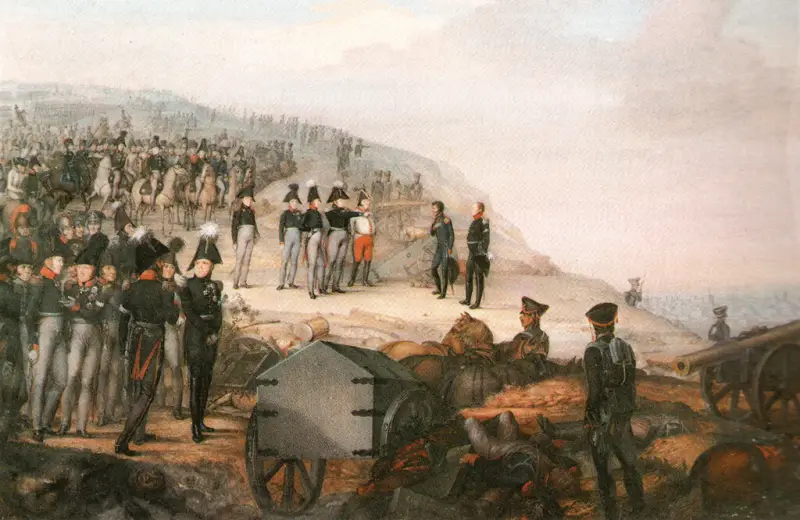
Surrender of Paris. Ivan Zheren
The Allies agreed to release French troops from Paris, but retained the right of pursuit. The French had to leave the city before 7 am on March 31st. The Allies could enter the city no earlier than 9 am on March 31st. The National Guard and Gendarmerie laid down their arms. All arsenals and military warehouses were transferred intact to the allies.
The last article of the treaty read: “The city of Paris is transferred to the generosity of the allied sovereigns.” The agreement was signed by the parties at 2 a.m. on March 31 in the village of Lavilette.
From the Notes of a participant in the events of the Russian officer N. I. Lorer:
Napoleon once said: If Montmartre is taken, Paris must surrender - and the words of the great man were justified in practice: Montmartre was taken, and Paris is sending envoys.
Russian banners flutter on the top of Montmartre and it is not for nothing that its steep sides are drenched in expensive Russian blood: it bought the opportunity for the magnanimous Alexander to save the troubled capital of France...
No! Peru cannot convey our delight and joy.”
In the fierce battle for Paris, the Allies suffered heavy losses: up to 9 thousand people, more than 7 thousand of them were Russians. The French lost about 4 thousand people. The Allies captured 86 guns on the battlefield and received another 72 guns after the city surrendered.
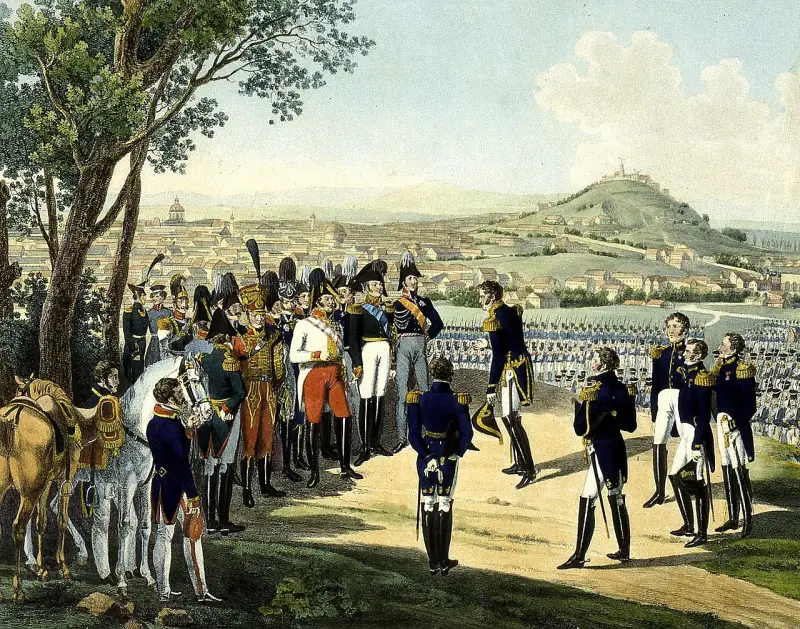
Marshal Marmont presents the keys to Paris to Russian Emperor Alexander I. Karl Heinrich Rahl
Allied army in Paris
At noon on March 31, 1814, troops of the Sixth Anti-French Coalition entered Paris.
The Austrian Emperor Franz II, whose daughter was Napoleon's wife, did not participate in the ceremony. Blucher, under the pretext of illness (he personally hated Bonaparte and the French, was offended by the ostentatious diplomacy of the monarchs), transferred command to Barclay de Tolly and arrived in Paris as a private citizen.
The Russian troops celebrated wildly: they had avenged Moscow!
The guardsmen were preparing for the greatest parade of their lives. Regimental marches were played on the Montmartre Heights. Allied troops entered Paris through the Saint-Martin gate. The columns marched with drums, music and waving banners. A huge number of people watched the spectacle. Greetings were heard to the Russian Emperor and the army.
– Mikhail Orlov recalled.
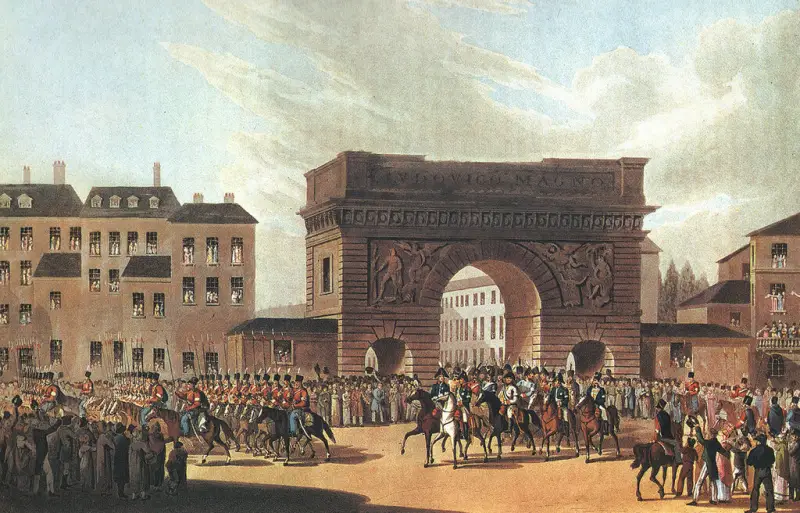
Allied forces enter Paris on March 31, 1814. English engraving by unknown artist
The ceremonial procession was opened by a light horse guards division led by Cossacks, followed by cuirassiers and hussars of the Prussian Royal Guard, then dragoons and hussars of the Russian Guard. Behind them is Emperor Alexander, on his left is King Frederick William III of Prussia, on his right is Prince Schwarzenberg, representing the Austrian Emperor Franz.
Following them, keeping their distance, is a brilliant retinue of many generals of the allied nations. Among them is Barclay de Tolly, who was elevated to the rank of field marshal for the battle for Paris. The march is completed by the Austrian and Russian grenadier corps, the infantry of the Russian guard and three divisions of Russian cuirassiers.
A Frenchman stepped forward and addressed the Russian Tsar:
Alexander answers:
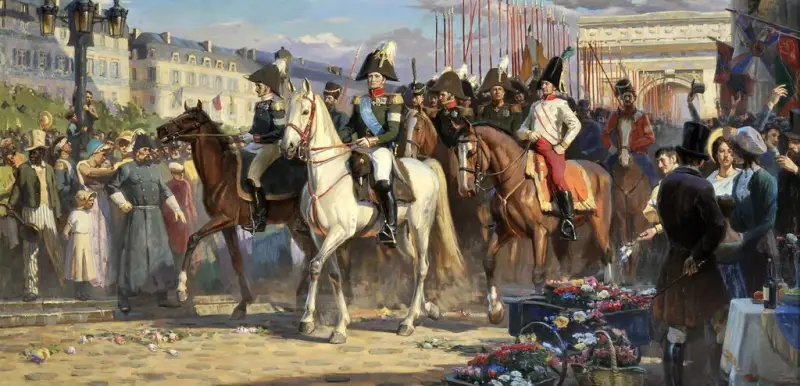
Triumph of the Russian army in Paris. Sergey Troshin
Having reached the Champs Elysees, the king and his retinue stopped on the main avenue and let the allied troops pass before them in a ceremonial march.
The fears of Parisians that they would be robbed, slaughtered and raped by “Cossacks and Asians” were not justified. The Russians paid for everything in cash and behaved decently. The famous ataman Platov, knowing the violent habits of his Cossacks, issued an order:
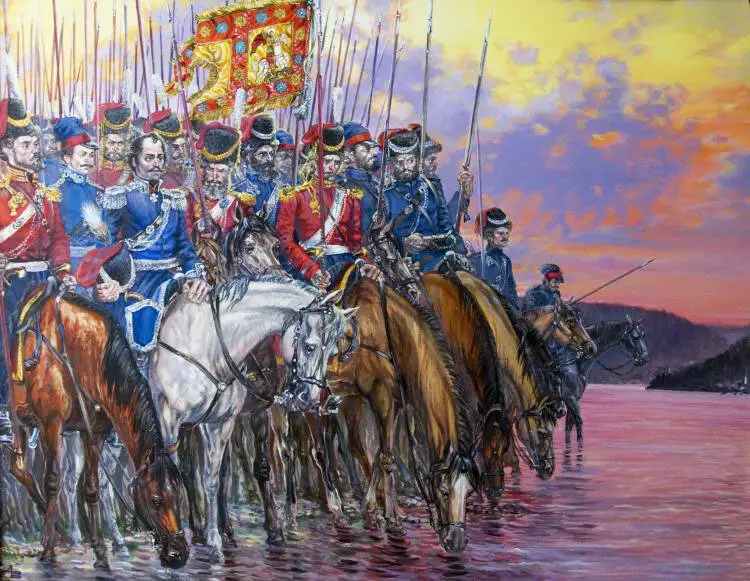
With honor, the Cossacks of Ataman Platov carried their battle banners across Europe. We entered Paris. Vladimir Doronin
Information